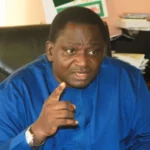For many Nigerians, electing a leader of unquestionable legitimacy — one chosen through free and fair elections, unmarred by violence and other criminal violations of election laws — will provide, at long last, national pride and faith in the electoral process as a genuine representation of the people’s decisions. But the 2023 general election is considered one of Nigeria’s most controversial since the country’s return to democracy in 1999, according to several election observers. CCIJ investigates the breaches of laws during the election and the challenges facing electoral integrity in the country.
Elections in Nigeria are governed by a comprehensive set of laws and regulations,and disturbing incidents occurred during the last election that seriously violated all of them.
The Centre for Collaborative Investigative Journalism (CCIJ) found that numerous people and institutions — including INEC, the official body responsible for enforcing election laws, members of the military, political parties and leading politicians — committed illegal acts related to the elections.
The election-related laws and regulations of Nigeria found to have been violated include the 1999 Nigerian Constitution (as amended), the Electoral Act of 2022, guidelines established by the Independent National Electoral Commission (INEC), and international conventions to which the country is a signatory.
The abuses that CCIJ documented reveal significant weaknesses of the laws, both in how they operate and how they are enforced.
For instance, a temporary INEC staffer transporting ballot papers was shot and killed by an army unit on election day; the INEC itself awarded a contract to print election materials to a company owned by a governorship candidate, raising questions about conflict of interest and the potential for corruption; a former president, his attorney general and justice minister openly displayed their ballots in a system that is supposed to protect voting in privacy; political parties blatantly disregarded laws requiring financial disclosures; and journalists were attacked and harassed while covering the election in a clear violation of press freedom.
Taken together, these incidents highlight the serious challenges facing Nigeria’s electoral system since 1999, when Africa’s most populous country returned to civil rule.
Men in military uniforms open fire on INEC staff on election day
Paul Abaji, an electoral officer at Obi-Obetti Umutu, Delta state in southern Nigeria, is one of the victims of the violence that characterized last year’s general election.
The INEC recruited him as an ad hoc staff member while he was undertaking his compulsory one-year national youth service in the state.
The National Youth Service Corps (NYSC) was established in 1973 under the leadership of then Head of State, Yakubu Gowon.
Each year, graduates from universities and polytechnics across the country are mobilized in large numbers to participate in the programme.
The Independent National Electoral Commission (INEC) frequently relies on NYSC members during election periods to meet the demand for manpower, recruiting them to help manage and oversee the electoral process. This partnership plays a key role in ensuring the smooth conduct of elections nationwide.
Mr Abaji was transporting ballot papers to the collation centre on election day with his colleagues Defeware Okemute, Chibuzor Oliaku, Iroy Christian and Amale Anthony, when men in military uniforms allegedly shot at the 18-seater Toyota Hiace in which they were traveling along Umuaja road in Umutu.
Mr Okemute, who had previously worked as a teacher, died, while Messrs Abaji, Oliaku and Christian all sustained multiple gunshot wounds. Mr Anthony sustained one gunshot wound and still carries the bullet in his body. Two women — ad hoc INEC staff who were also riding in the vehicle — survived the attack without injuries.
No one has been prosecuted for the killing of Mr Okemute, according to field evidence gathered by the CCIJ. The Delta State Police have confirmed that the case remains under investigation and that no arrests have been made in connection with the shooting.
This attack is just one in a long list of assaults against INEC officials in recent years, despite the fact that Nigerian law prohibits the use of violence or threats during elections.
Data from the commission show that between 2019 and 2022, there were 50 incidents of attacks on INEC offices across 15 states.
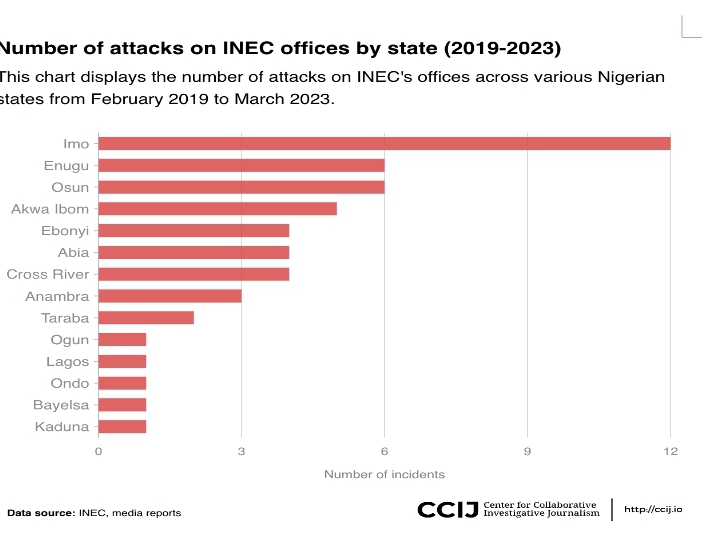
The violence continued during the 2023 elections, with five new attacks on election officials reported from December 2022 to March 2023, a CCIJ analysis of media reports found.
Many of the incidents of violence in the last election were carried out by members of the Eastern Security Network (ESN), the militant wing of the Indigenous People of Biafra (IPOB), a separatist group that opposed the conduct of elections in Southeastern Nigeria due to the federal government’s refusal to release their leader, Nnamdi Kanu.
While the violence inflicted by ESN was widely reported, attacks attributed to state actors — like the one that killed Mr Okemute and injured Mr Abaji and his colleagues — were underreported.
Residents of the community where the shooting occurred said the suspects were soldiers posted to provide security for Platform Petroleum Limited, a private oil and gas company chaired by Dumo Briggs, a lawyer and businessman.
Since the start of the Niger Delta conflict, private oil and gas companies in the region have been applying for the use of military personnel to protect their facilities.
When contacted, Nigerian Army spokesman Major General Onyeama Nwachukwu refused to identify the soldiers stationed at the company and did not confirm that soldiers were involved in the shooting. However, a physical visit to the location by the CCIJ verified the presence of a military post at the oil company’s premises in Umutu.
Narrating what led to the deadly encounter, Mr Abaji said they were on their way to the local government collation office when an argument ensued between their driver and some youths who attempted to block the vehicle.
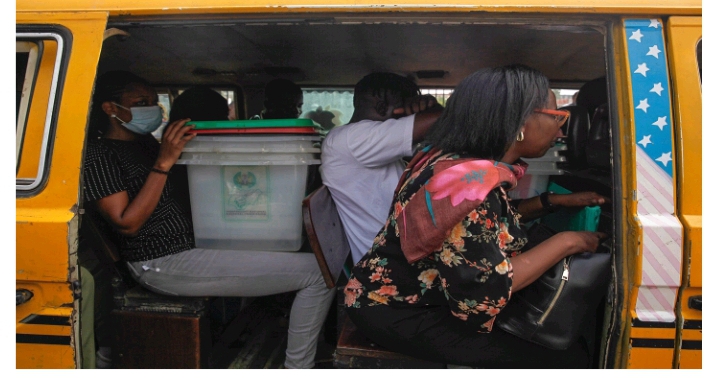
According to Mr Abaji, the youths did not want the INEC officials to take the election materials back to the headquarters — they wanted them to upload the results in that community instead. But the INEC officials resisted their efforts and continued driving.
The law requires that election results are counted and uploaded on the INEC Result Viewing Portal (IReV) only at the polling unit where the election was conducted in the presence of voters and party agents.
Unknown to Mr Abaji and his colleagues, the youths had gone ahead to a nearby military checkpoint and falsely informed the soldiers that the INEC officials were a dangerous group trying to escape with ballot papers.
“As we came closer to the military checkpoint, the soldier opened fire on us without any warning or attempt to stop us,” Mr Abaji said.
“After the shooting incident, we learnt that youths in the community from where we left told the army officials on duty that we were ballot box snatchers and these officials acted on this instruction to shoot at us,” he told CCIJ.
Multiple witnesses also confirmed to CCIJ that there was an altercation between the youths and the INEC officers over the ballot papers and where the results should be uploaded.
But Mr Abaji and the other victims maintained that they did not work in the community where the attack occurred — and that it didn’t make sense to upload the results there. They had travelled to Umutu to board the 18-seater van that would take them to their head office, suggesting a case of the wrong identity.
“We only went to join the vehicle that would convey us to the INEC head office. We did not conduct elections in the community, so there was no way we would even have uploaded the results. In any case, those who conducted elections in the community were told to upload results only when they got to the INEC office,” one of the victims, Iroy, told CCIJ.
Mr Abaji was shot in the thigh multiple times. As a result of the severe injury to his right leg, he can now barely walk.
Before the shooting, he was an active football player and author of two books, which he promoted by travelling around and sharing snippets of his stories.
With the injury, he can no longer play football or market his books, “No Shortcut to Success” and “Woman of Faith.”
His colleague Mr Oliaku told CCIJ that multiple bullets hit him in the abdomen, which now causes swelling in his legs and genitals. Doctors have also diagnosed him with a hernia as a result of the gunshot and urged him to undergo an urgent operation.
A resident who helped the wounded Mr Oliaku said the INEC employee was drenched in blood when he ran toward her house while the men in military uniforms continued searching for him.
“I cleaned the wounds with methylated spirits and cotton wool, and told him to pray to God as I struggled to keep him alive,” she said.
The Good Samaritan who is not named in this report for safety reasons said she was motivated to help him only because he was wearing a youth corps member uniform and she did not think he could have been involved in illegal activities.
Corps members usually identify themselves on election day by wearing their NYSC and INEC uniforms.
Another INEC official, Christian, now struggles with his eyesight after a bullet grazed his face and caused swelling to his left eye. He also sustained an injury to his shoulder and can no longer raise his hands as a result, although doctors have yet to state the exact cause and diagnosis.
The former INEC staffers said they were abandoned by INEC. Despite the commission’s promise of providing health insurance, Mr Abaji and his colleagues did not receive such support and were left with costly medical bills due to their extensive injuries.
In November 2023, Bukola Ojeme, the Public Relations Officer for the Delta State Electoral Commission, assured CCIJ that the INEC was actively working on providing health insurance for victims of election-related violence.
In a video interview with CCIJ, Mr Ojeme explained that the insurance would help the injured INEC officials cover their medical expenses and assist with major bills related to their treatment. He also confirmed that those who have already incurred costs would be reimbursed through the insurance programme. INEC has asked victims to submit medical reports from the hospitals where they are receiving treatment as part of the reimbursement process.
However, eight months later, one of the victims, Mr Abaji, has yet to receive any support. After undergoing multiple surgeries to avoid the amputation of his leg, he had to pause further medical care due to financial constraints, claiming that INEC abandoned him despite promises of compensation.
When contacted again in February 2024, Mr Ojeme said he was unaware of Mr Abaji’s discharge from the Federal Medical Centre in Asaba and could not comment on his current condition.
CCIJ also obtained a medical report from Mr Christian, who spent N2.17 million ($2,814) on treatment for face and shoulder injuries at Dominion hospital in Asaba. Despite the significant expenses, his recovery remains uncertain.
On June 5, 2024, CCIJ obtained documents showing that the INEC in Asaba had reached out to the victims, requesting their health status reports and other relevant information to revisit their cases.
This outreach came one year and three months after the shooting. However, Ossai Christian disclosed that despite sending the requested documents on several occasions, there have been no interventions by the government for his brother, Iroy Christian.
As for Defeware Okemute, the former teacher who died in the shooting, Mr Ojeme told CCIJ that the INEC did not have the details about his death. However, in a subsequent statement, he cited privacy concerns as the reason for not disclosing the victim’s name, contradicting the earlier claim of lacking information.
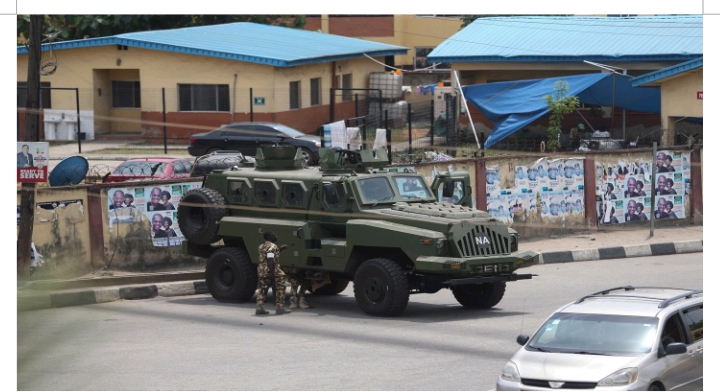
Similarly, Bright Edafe, the Delta Police Public Relations Officer, did not provide any useful information about the identity of the soldiers responsible for the shooting when CCIJ reached out to him.
“We are investigating the incident and we are yet to have any information regarding the attackers,” he said.
CCIJ followed up with phone calls in January 2024, nearly a year after the incident occurred, but he did not respond.
The Nigerian police force is notorious for ignoring journalists’ inquiries. This pattern of non-disclosure highlights the challenges faced by the victims of attack during the last election.
Legal experts maintained that both the police and INEC have the responsibility to prosecute electoral offenders, and their reluctance to do so raises questions about their commitment to justice.
Nigerian Army’s response
CCIJ reached out to the spokesperson of the Nigerian Army, Brigadier General Onyema Nwachukwu, who initially denied knowledge of the incident but promised to respond after further investigation.
He later said that such an incident never occurred, suggesting that criminals could have used army uniforms to carry out the act.
“The persons who carried out the attack may not be army personnel, I will however get back after an investigation,” he said.
When the CCIJ presented eyewitness evidence to Mr Nwachukwu, he promised to respond. Despite a follow-up query in July 2024, Nwachukwu has not responded as at the time of this publication.
A former director of the Nigerian Army Public Relations, Bólájí Koleoso, told CCIJ that the rules of engagement do not allow the army to shoot indiscriminately and it is not permissible to fire live bullets at unarmed persons.
“You cannot fire live bullets against unarmed persons, except if during the process of snatching the ballot for instance, there is injury or loss of lives, then the army can shoot,” Mr Koleoso told CCIJ.
INEC awards printing contract to company belonging to candidate in a guber election
Last year, widespread media reports revealed that the INEC awarded a contract worth N434 million (approximately $500,000 USD) to a printing company owned by All Progressives Congress (APC) politician Aishatu Ahmed, also known as Binani. The contract was for the printing of results sheets and other security documents for the elections. This raised concerns over a potential abuse of the contractual process, as Ms Binani herself was a governorship candidate in the same election under the ruling APC.
Given the sensitive nature of electoral materials, which qualify as security documents, the procurement would typically follow a restricted bidding process to safeguard transparency and fairness.
CCIJ revisited the contract award, highlighting the flagrant abuse of procurement law and the INEC’s own guidelines.
Section 40 of the Public Procurement Act, 2007 outlines the process for restricted bidding, emphasising the need for a transparent and accountable process in awarding contracts.
Awarding an election-related contract to a company owned by a gubernatorial candidate in that very same election presents a clear conflict of interest, as described in Section 57 (12) of the 2007 law.
Addressing the issue of a conflict of interest, INEC claimed that Ms Binani was not listed as a director in the Corporate Affairs Commission portal. But the portal listed “Aishatu Dahiru” as the only person with significant control of the company, and a quick google search shows “Aishatu Dahiru” is Aishatu Binani, the former senator.
Official press statements issued by the INEC noted that the contract was awarded to “Binani Printing Press Limited.” However, checks by the CCIJ shows that the organisation has since changed its name, going by “Binani printing and publishing limited,” per official details on the corporate affairs commission portal.
Despite numerous calls and in-person visits, INEC, Ms Binani and their staff refused to provide any answers.
Party bigwigs break election laws without sanction
Not only did the military and the INEC breach electoral laws and regulations, politicians also openly flouted several aspects of the law with impunity. For example, former President Muhammadu Buhari and other politicians across the political divides flagrantly breached the Electoral Act 2022 and INEC guidelines.
Mr Buhari was photographed displaying his ballot in a way that showed who he voted for. Other prominent political figures such as the former Attorney-General of the Federation, Abubakar Malami, Orji Kalu, Senator representing Abia North Senatorial District, and the former Governor of Benue State Samuel Ortom also displayed their ballots to the public.
This was a clear violation of the Electoral Act, which states that elections shall adopt an “open secret ballot” — a process of voting in which the exercise is carried out in a public space, while each voter makes a decision in private.
Section 122 (3) of the electoral act states that no person shall “communicate at any time to any other person information obtained in a polling unit as to the candidate to whom a voter is about to vote or has voted for.”
Nigerian former president Muhammadu Buhari showing his ballot paper to journalists on the day of the presidential election in Daura, Katsina state. Photograph by Samad Uthman/CCIJ
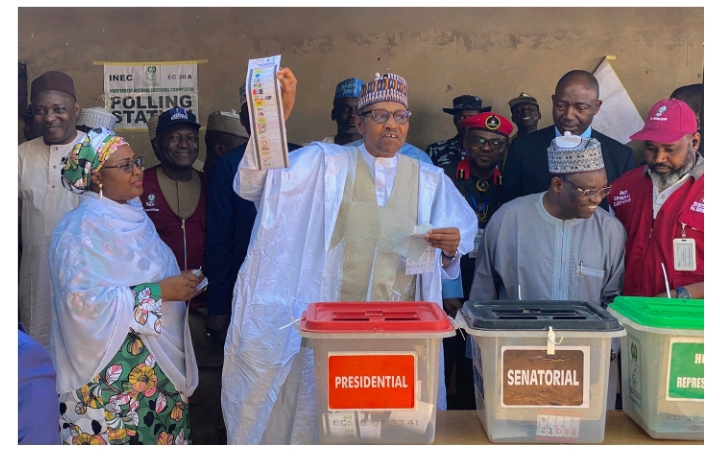
INEC’s electoral guidelines for the 2023 elections also prescribed confidentiality of the voting exercise. Prior to the election, the Commission also warned voters against displaying their ballot papers.
Showing a ballot at the polling place violates the law, partly because it is considered a form of campaigning, which is illegal at the polling place. The law recommends a maximum fine of N100,000 ($60) or imprisonment for a term of three months or both for the offender.
Chris Nwaokobia, a human rights lawyer, told CCIJ that Mr Buhari’s act was illegal.
“The law should be invoked against such acts in order to forestall leaders using such influence to compromise the electoral process,” Mr Nwaokobia, a professor, said.
To date, neither the former president nor the other politicians have been held accountable.
Garba Shehu, a media aide to the ex-president, said in an interview with a local television station, AIT, that he did not blame the president for displaying his ballot paper.
Mr Buhari had also defended his decision, saying that he showed his ballot because of his excitement for the candidacy of his successor Bola Tinubu, and his allegiance to his political party.
Political parties flagrantly violate electoral laws without sanction
Violations of electoral laws were not limited to soldiers, politicians, and the INEC; political parties also engaged in actions that raised serious concerns about the integrity of the election.
The Electoral Act requires political parties to submit and publish certain financial disclosures as an important means of transparency and accountability. The law also requires the INEC to publish certain financial documents submitted by the political parties. But many political parties, along with the INEC, still need to meet these requirements.
Section 89 of the Electoral Act requires political parties to submit their audited election expenses to the INEC within six months after an election. They are also required to publish a certified version of the expenses in at least two national newspapers and the official party website.
The law clarifies the expenses as those payments made within the period the INEC gave notice for the conduct of the election and the day the election is held.
CCIJ monitored the official political party websites as well as major national newspapers within that period and found that none of the parties had fully complied with the law.
When the CCIJ reached out to the All Progressives Congress National Publicity Secretary Felix Morka, seeking if the party had complied with the provision of the law, he promised to check and get back to our reporter. He never did.
When CCIJ contacted him again in January, he claimed that he didn’t have the information and asked our reporter to check in again after he consulted with his colleagues.
Weeks later, CCIJ reached out to him again. The publicity secretary said he had yet to receive documentation from the party to show whether the APC filed the financial statements.
The Labour Party at various points had independently disclosed how it spent its money. For instance, a press statement signed by the party’s chief spokesperson, Yunusa Tanko, addressed these issues, yet INEC has not officially released these documents as mandated by law.
The CCIJ also contacted the National Publicity Secretary of the Peoples Democratic Party (PDP), Debo Ologunagba. He did not pick up, nor did he respond to the message sent to his WhatsApp account on whether his party submitted its financial and election spending reports to the INEC.
Similarly, section 86 (1) requires every political party to submit to the INEC “a detailed annual statement of assets, liabilities, and analysis of its sources of funds and other assets, together with a statement of its expenditure including hard and soft copy of its list of members or in such a form as the Commission may require.”
The law states that any party officials who fail to do so are liable to a fine of N1,000,000 ($800) or a six-month jail term, or both.
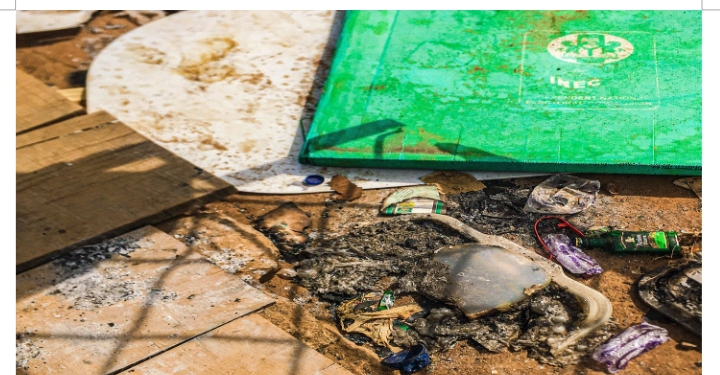
Subsequently, INEC is required by the law to publish the audited report in two national newspapers and its websites within 30 days of receipt of the results.
As of press time, INEC has not published a single audited report in the newspapers or on its website.
INEC National Commissioner and Chairman of Information and Voter Education and Committee, Sam Olumekun, said 18 of the 19 political parties have already submitted their financial reports. (He refused to name the remaining party that has not done so).
He claimed the INEC still needed to audit the reports and notify the National Assembly before publishing them.
But the law does not require the National Assembly’s approval prior to publication, and section 86 (4) states that the INEC shall publish these financial records and audits in two national newspapers and on its own website within 30 days of receipt of the results.
Mr Olumekun promised that the INEC would make the reports and the audits public by July 18.
However, the INEC still has not done so as of the time of this report. INEC had previously criticised various political parties for violating the law on the financial expenditures. But the commission has never sanctioned any defaulter, and has itself violated the Electoral Act’s requirements in this election as provided in Section 86(4) and Section 89 (8) of the Electoral Act.
Attacks on journalists
Oba Adeoye, a journalist with Arise News, was excited to cover the March 18 governorship election in Lagos — the seventh such election held in the most populous city in Nigeria since 1999. On election day, he and his cameraman Opeyemi Adenihun, together with their driver, Yusuf Hassan, headed to Elegushi Palace along Lekki, Lagos, to film the voting exercise.
But as soon as they unpacked their camera and drones to capture the area view, a group of thugs known as the “Area Boys” in Lagos confronted them, asking why the journalists were there to record them.
A few moments later, the thugs descended on Adenihun, beat him and seized his video camera, all in the presence of military officers nearby.
Mr Adeoye said the thugs were sponsored by a former commissioner in the state, although the journalist declined to identify him by name.
The journalist reported the assault to the Ilasan Police Station, but his company management asked that the case be discontinued. Adeoye also was not keen to pursue the matter because of the time and costs of a lawsuit.
In Nigeria, a court case could last for years and require several million (naira) in litigation costs. Due to these obstacles, offenders are often able to violate human rights — including those of journalists — without consequence.
Like the Arise TV crew, several other journalists were unable to freely carry out their duties during the 2023 general election despite provisions of the Electoral Act that protect their right to do so.
Section 128 prohibits violence or the threat of injury during elections, and Section 39(1) of the 1999 Constitution of Nigeria guarantees freedom of expression, including the right to receive and impart information.
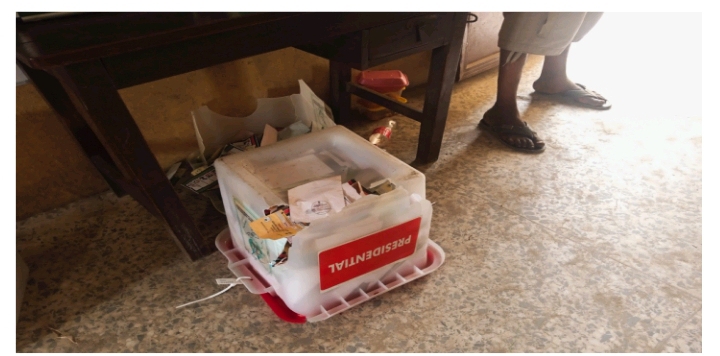
Similarly, the United Nation (UN) Security Council Resolution 1738 (2006) and UN Human Rights Council Resolution 27/5 of 25 September 2014 provide for press freedom and journalists’ safety.
Each of these legal provisions were flagrantly breached during the last election.
The Committee to Protect Journalists (CPJ) reported that at least 14 journalists and media workers who covered the presidential and national assembly elections in Nigeria last year were detained, harassed, or attacked while at least another 28 were obstructed, harassed, or attacked covering the governorship and state assembly elections.
Commenting on the attacks on journalists during the election, the Programme Director of Media Rights Agenda (MRA), Ayo Longe noted that there was a rise in the number of journalists attacked during the February and March 2023 general elections compared to the months before the election.
“The systems and institutions that ought to check impunity have either been compromised or bought over and as a result, justice is selective. There is impunity in the land because those who attack journalists are not afraid that the law will catch up with them.”
One attack was carried out on a vehicle carrying two News Agency of Nigeria journalists in Oyo state during the presidential and national assembly election.
Ibukun Eniola, a reporter, said some youths playing ball on the road harassed her and a photojournalist colleague and damaged their vehicle even though they were wearing INEC badges that identified them as journalists.
CCIJ called Oyo Police Command Public Relations Officer, Adewale Osifeso, several times to inquire about those arrested. He neither answered the calls nor responded to the message sent by WhatsApp.
In March 2023, five people wearing masks and armed with axes threatened violence and chased journalists covering the election in Ogun State, but no one was killed, according to media reports. The leader of the group was identified only as Taiwo.
Similarly, Journalist Joke Adeyele of PM News, who was one of the victims, confirmed that the incident occurred in Itori Odo, about 60 kilometres north of Lagos.
The Ogun State Police Command said it arrested 30 suspects for disrupting the electoral processes and violence. The then-Commissioner of Police, Frank Mbah, who is now a Deputy Inspector General of Police, said the suspects were arrested in different parts of the state for unlawful possession of firearms, inducement and vote buying.
When the CCIJ reached out to Omolola Odutola, the Public Relations Officer for the Ogun State Police, for an update on the arrested suspects, she declined to comment, stating that the incident occurred before her appointment as PPRO. The arrests in question were made by Nigerian police officials working under and alongside the personnel listed above.
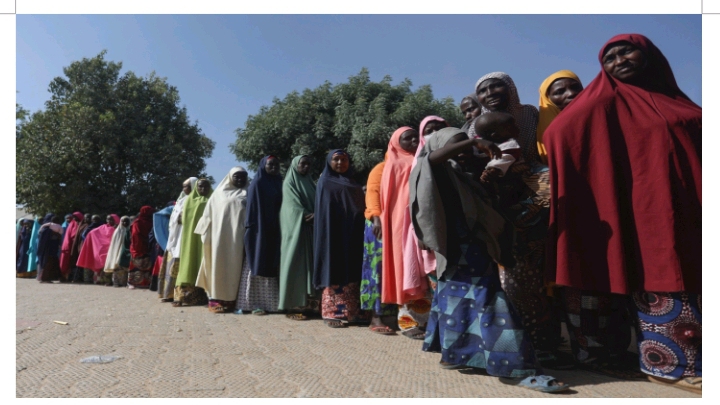
In Gwale, Kano State, the political stronghold of New Nigeria People’s Party, Ashiru Umar, a freelance writer, shared how he was beaten by thugs allegedly working for APC.
“They were intimidating all voters that were not supporting APC,” Mr Umar recalled. His efforts to report on the election were met with violence, as he was attacked and beaten by thugs for conducting interviews. He sustained bruises on his hands and elbows and required over a month of medical treatment.
“My phone got damaged when the incident happened, and later on, we managed to leave the area. Unfortunately, all this happened while the security agents were watching,” he recalled.
In addition to the attacks on journalists, there were an additional 11 cases of electoral violence in Osun State which led to the death of five civilians, according to multiple media reports.
Four of these incidents happened during the presidential election. The Osun State Peace and Mediation Working Committee, a civil society organization (CSO), corroborated these findings.
According to the CSO, the primary perpetrators of this violence were identified as hired thugs, with security agents allegedly acting as accomplices.
CCIJ cannot independently verify who sponsored these thugs, but Nigeria has a history of politically sponsored thuggery during elections.
To curb the incessant attacks on journalists and the media, Longe of Media Rights Agenda said that law enforcement agencies should wake up and live up to their responsibility of maintaining law and order rather than being allowed to be used to fight individuals’ battles.
Public interest lawyer Jiti Ogunye said unpunished electoral crimes encourage repetition.
He stated that prosecuting electoral offenders is a collective responsibility, but politicians, — who often benefit from violations of law — avoid punishing offenders, thus perpetuating the cycle of electoral crimes.
“It is important, therefore, that the politicians themselves are dealt with.”
This story was produced with the support of MuckRock and the Filecoin Foundation for the Decentralized Web.

 Join Daily Trust WhatsApp Community For Quick Access To News and Happenings Around You.
Join Daily Trust WhatsApp Community For Quick Access To News and Happenings Around You.